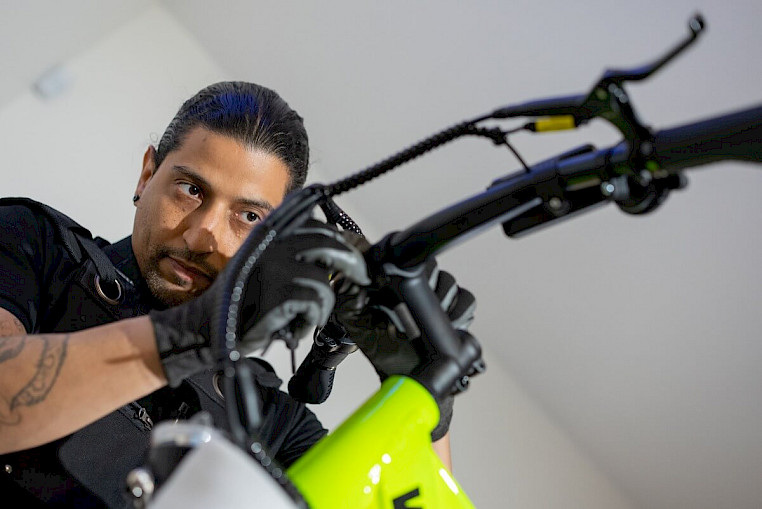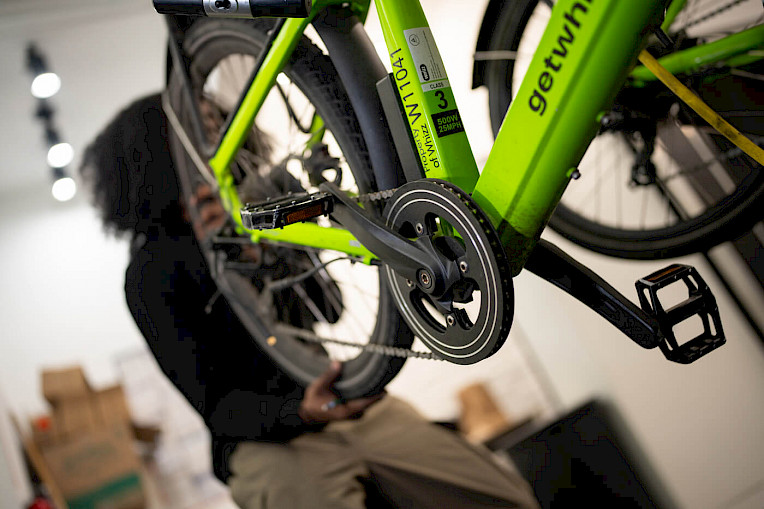Care and Maintenance
Electric bike troubleshooting guide
Jul 17, 24
We’ve compiled a comprehensive list of the most common e-bike problems and how to troubleshoot them.
From diagnosing power and battery issues to tackling electrical system malfunctions and mechanical problems, we'll walk you through step-by-step solutions below.

If your electric bike battery is not charging or holding a charge, check the battery connections to make sure they’re secure and free from corrosion.
Next, try charging the battery using a different charger or power source to rule out any faults with the charging equipment.
If the battery still does not charge, you may need to inspect the battery cells for any signs of damage or wear.
First, check the battery charge level to ensure it hasn't depleted completely.
If the battery charge is low, switch to a lower power assist mode or pedal without assistance to conserve the remaining power.
If the issue persists, manually pedal the bike to your destination and get help from an e-bike mechanic.
If you're experiencing inconsistent or weak motor assistance on your electric bike, start by checking the battery charge level to ensure it's adequately charged.
Then examine the motor cables and connections to ensure they’re securely attached and free from damage or corrosion.
Finally, review your e-bike's settings to ensure the power assist mode is properly adjusted to your desired level.
First, check the connections between the display/control unit and the wiring harness to make sure they’re secure.
If the connections are intact, try resetting the display/control unit by turning off the bike and disconnecting the battery for a few minutes before reconnecting it.
If the problem persists, check if the display/control unit has any error codes or error messages, as they can provide clues about the underlying issue.
If you're experiencing loose or damaged wiring connections, carefully inspect the wiring connections, looking for any signs of loose or disconnected wires, frayed insulation, or damaged connectors.
If you find any issues, gently reconnect or tighten the loose connections and secure them properly.
In the case of damaged wiring, replace the affected sections with new wires of the appropriate gauge and insulation. Seek help from a qualified technician or bike shop if you're unsure about handling electrical repairs.
Start by checking the connections between the affected components and the main wiring harness to ensure they’re securely attached.
If the connections are secure, inspect the components themselves for any signs of damage, such as loose bulbs or cracked casings.
Replace any faulty bulbs or damaged components with compatible replacements.
If the problem persists, check the fuse for the lighting system and replace it if necessary.
It's also a good idea to test the electrical system using a multimeter to ensure the proper voltage is reaching the components.
First, check the brake pads for wear and tear, ensuring they have sufficient thickness and are properly aligned with the brake discs. If necessary, replace the brake pads with new ones.
Next, examine the brake cables for any signs of fraying or stretching, and adjust or replace them if needed.
It's also crucial to inspect the brake calipers and discs for any damage or warping, as this can affect braking performance and create unwanted noise.
First, check the cable tension to make sure it's properly adjusted. A simple tweak might be all it takes to restore seamless shifting.
Next, inspect the derailleur and jockey wheels for any debris or signs of wear. Cleaning and lubricating these components can do wonders in improving shifting performance.
First, check the spoke tension to see if the spokes are properly tightened. A quick adjustment with a spoke wrench might be all it takes to straighten things out.
Next, inspect the rims for any dents or damage that could cause wobbling. If you find any issues, it might be time to replace the rim or seek professional help.
Don't forget to check the tire pressure to see if it's at the recommended level for a firm grip on the road.

You can prevent e-bike issues with regular maintenance, proper care and storage. Here are some preventative measures you can take to increase the lifespan of your e-bike and reduce your trips to the bike mechanic.
To keep your battery healthy, avoid leaving it fully discharged for extended periods, as this can lead to capacity loss. Don't keep it constantly at full charge for long durations either, as this can strain the battery.
Use the recommended charger provided by the manufacturer and follow the charging guidelines specified in the user manual.
Avoid charging in extreme temperatures.
When storing your electric bike or battery, make sure it’s kept in a cool and dry place. Extreme temperatures, both hot and cold, can negatively impact battery performance and longevity.
Avoid excessive vibration. Vibrations can damage the battery cells over time, so use proper mounting and secure the battery to minimize vibrations during rides.
Periodically clean your battery with a soft, damp cloth to remove dirt and grime. Inspect the battery and its connections for any signs of damage or corrosion.
Always refer to the manufacturer's instructions and guidelines for specific battery care and storage practices.
Different batteries may have varying requirements, so it's essential to follow the recommendations specific to your model.
Regularly inspect your e-bike for any signs of damage, wear, or loose components.
Check the frame for cracks or dents, examine the tires for wear or damage, and inspect the brake pads for proper alignment and wear.
Tighten any loose bolts or fasteners and address any issues promptly.
Inspect the electrical components, such as wires, connectors, and the display, for any signs of damage, loose connections, or corrosion. If you notice any issues, consult the manufacturer's instructions or seek professional assistance.
Regularly clean your electric bike to remove dirt, grime, and debris. Use a gentle soap and water solution or bike-specific cleaning products.
Pay attention to hard-to-reach areas, such as the drivetrain, suspension components, and the underside of the bike.
After cleaning, thoroughly dry the bike to prevent rust and corrosion.
Apply lubricant to key components such as the chain, derailleur, and brake pivots. This helps reduce friction, prevents wear, and ensures longer bike life.
Software updates often contain bug fixes, performance enhancements, and new features that can improve the overall functionality and safety of your e-bike.
Most software updates can be performed directly from your e-bike’s mobile app.
Firmware contains the code that manages your e-bike’s motor and sensors.
Firmware updates can often be performed directly from your e-bike’s app, but some firmware updates might require additional steps.
Check the manufacturer's website for the latest firmware version and follow their instructions for the update process.
Before initiating the update, make sure your bike's battery is adequately charged and that you have a stable internet connection.
If you encounter any problems during the firmware update or experience issues afterward, such as error messages or functionality problems, consult the manufacturer's troubleshooting guide or contact their support team.
During updates, follow the on-screen prompts and avoid interrupting the process to prevent any potential issues.
Related: Most essential bike safety gear for delivery riders


If you rent or buy an e-bike at Whizz, you’ll get access to affordable maintenance and repairs from our skilled e-bike mechanics.
We’re experienced in both the mechanical and electrical systems that power your e-bike, taking the guesswork out of inspecting and repairing your e-bike yourself.
Thinking of taking one of our e-bikes for a free test ride?
Don’t miss $20 off on your first month with code WOW
You'll receive a call back soon!
By clicking button you agree with the Privacy policy and Cookie Policy
Read Also: How to maintain your electric bike
Schedule a time
to pick up your e-bike
We'll confirm your booking with a phone call.
Get your ride without any hassle –
no SSN required!
Step 1
Reserve your e-bike now
Step 2
Pass the online verification
Step 3
Pick up your bike in NYC or get it delivered
